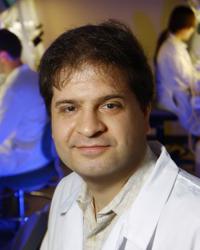Research Lab Results
-
Xiao Group
The objective of the Xiao Group's research is to study the dynamics of cellular processes as they occur in real time at the single-molecule and single-cell level. The depth and breadth of our research requires an interdisciplinary approach, combining biological, biochemical and biophysical methods to address compelling biological problems quantitatively. We currently are focused on dynamics of the E. coli cell division complex assembly and the molecular mechanism in gene regulation. -
Youngjee Choi Lab
Research in the Youngjee Choi Lab focuses on ambulatory care, cancer survivorship, high-value care and medical education.
-
Yukari Manabe Lab
Investigators in the Yukari Manabe Lab evaluate the accuracy of rapid, point-of-care diagnostics for HIV, tuberculosis and related infectious diseases in resource-limited settings particularly sub-Saharan Africa and examine the impact of diagnostic interventions on disease detection and patient outcomes. The team also conducts operational and translational research in tuberculosis and HIV co-infection.
-
Yun Guan Lab
Research is the Yun Guan Lab explores the peripheral, spinal and supraspinal mechanisms of chronic pain. Our long-term goal is to develop better strategies and novel targets for treatment of pathological pain conditions. Our team’s multidisciplinary research uses electrophysiological, molecular biological, immunocytochemical and behavioral pharmacological approaches to study neurobiological mechanisms of pain and hyperalgesia that occur following tissue or nerve injury. -
Zachara Lab
Elevation of O-GlcNAc levels modulates numerous pathways in a manner consistent with increased cell survival, including the expression of heat shock proteins. The Zachara Lab's goal is to understand the O-GlcNAc regulated stress response, how this can be manipulated to improve patient outcome and how this response is misregulated in disease.
-
Zack Wang Lab
The Wang lab focuses on the signals that direct the differentiation of pluripotent stem cells, such as induced-pluripotent stem (iPS) cells, into hematopoietic and cardiovascular cells. Pluripotent stem cells hold great potential for regenerative medicine. Defining the molecular links between differentiation outcomes will provide important information for designing rational methods of stem cell manipulation.
-
Zackary Berger Lab
The research mission of the Zackary Berger Lab is to bridge evidence-based medicine and shared decision-making in the context of patient-centered care. Lab studies investigate how to accomplish this in the common case of uncertainty, while seeking to clarify the ethics of decision-making and empirically describe how shared decision-making is and should be done. Zackary Berger, MD, PhD, is an assistant professor in the Division of General Internal Medicine at the Johns Hopkins School of Medicine. In addition to his work as an internist and primary care physician, Dr. Berger is an associate faculty member in the Berman Institute of Bioethics, and core faculty in the Evidence Based Practice Center as well as the Center for Health Services and Outcomes Research.
-
Zambidis Laboratory
The Zambidis Labratory studies the formation of pluripotent stem cells and the subsequent hematopoietic, endothelial and cardiac differentiation, as well as the potential therapeutic uses of pluripotent stem cell-derived cells.
-
Zanvyl Krieger Mind/Brain Institute
The Zanvyl Krieger Mind/Brain Institute is dedicated to the study of the neural mechanisms of higher brain functions using modern neurophysiological, anatomical and computational techniques. Our researchers use various approaches to understand information processing and its influence on perception, memory, abstract thought, complex behavior and consciousness. Systems and cognitive laboratories use neurophysiology, brain imaging and psychophysics to develop a quantitative, network-level understanding of cognitive information processing. Other researchers use analytical approaches such as system identification, dimensionality reduction, information theory and network modeling to understand information processing. Other areas of research in the Institute include the study of how visual and tactile information processing leads to perception and understanding of two- and three-dimensional objects. Another focus is on neural processing and recognition of speech and other complex sounds. Still other laboratories study neural mechanisms of attention, memory formation, motor learning, decision-making and executive control of behavior. -
Zaver M. Bhujwalla Lab – Cancer Imaging Research
Dr. Bhujwalla’s lab promotes preclinical and clinical multimodal imaging applications to understand and effectively treat cancer. The lab’s work is dedicated to the applications of molecular imaging to understand cancer and the tumor environment. Significant research contributions include 1) developing ‘theranostic agents’ for image-guided targeting of cancer, including effective delivery of siRNA in combination with a prodrug enzyme 2) understanding the role of inflammation and cyclooxygenase-2 (COX-2) in cancer using molecular and functional imaging 3) developing noninvasive imaging techniques to detect COX-2 expressing in tumors 4) understanding the role of hypoxia and choline pathways to reduce the stem-like breast cancer cell burden in tumors 5) using molecular and functional imaging to understand the role of the tumor microenvironment including the extracellular matrix, hypoxia, vascularization, and choline phospholipid metabolism in prostate and breast cancer invasion and metastasis, with the ultimate goal of preventing cancer metastasis and 6) molecular and functional imaging characterization of cancer-induced cachexia to understand the cachexia-cascade and identify novel targets in the treatment of this condition.

